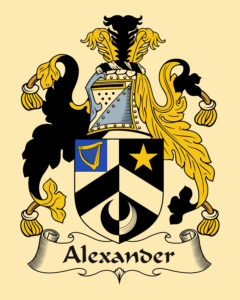
We sell our products exclusively on Amazon so you can buy with confidence knowing you are protected by Amazons no hassle return policy and our 4.9 star lifetime seller rating with over 2000 reviews. Items featuring a family crest make great gifts, whether for yourself or that hard to buy for family member, friend or co-worker.
We also sell customized license plates (add your own image and text). customizable mugs and license plates for military veterans, classic art on mouse pads and posters, a wide variety of flag license plates for nations around the world as well as pride flags and Native American tribal flags. Click here to go to our Amazon Store front.
We sell Mugs, Plaques, Prints, Ceramic Tiles, Coasters, Garden Flags, License Plates and Mouse Pads featuring The Alexander Coat of Arms. Click the image to go to Anglo/Irish names A section of our Amazon store.
Etymology
The surname Alexander has a rich and storied history, with roots tracing back to ancient Greek and Latin origins. The name itself is derived from the Greek name “Alexandros,” which is composed of the elements “alexein” (to defend) and “aner” (man), thus meaning “defender of men.” This etymology reflects the name’s early popularity, as it was associated with notable figures such as Alexander the Great, the ancient Macedonian king and military leader.
Earliest Recorded Use in England
In England, the surname Alexander first appeared in the medieval period. One of the earliest recorded uses of the surname in England is found in the “Hundred Rolls” of 1273, a census-like record that included various surnames in use at the time. The entries include “Hugh Alexander” and “Robert Alexander,” highlighting the name’s presence among the English populace during the 13th century.
The name’s adoption in England can be attributed to several factors, including the Norman Conquest and subsequent Anglo-Norman influence. The Normans brought with them many continental names, including Alexander, which found favor among the English nobility and clergy.
Earliest Recorded Use in Scotland
The surname Alexander has a particularly strong association with Scotland. It first appears in Scottish records in the early 12th century, linked to the nobility and the church. One notable early bearer was Alexander, the son of Malcolm III, King of Scots, and Queen Margaret. He became King Alexander I of Scotland in 1107. This royal connection greatly contributed to the name’s popularity in Scotland.
The name was often adopted as a given name and subsequently as a surname. The Alexanders became prominent in various Scottish clans, with several branches spreading throughout the country. The surname is particularly associated with the MacAlister (MacAlasdair) clan, a branch of the Clan Donald (MacDonald), indicating the Gaelic version of the name’s influence.
Earliest Recorded Use in Ireland
In Ireland, the surname Alexander likely arrived through Scottish and English settlers, particularly during the Ulster Plantation in the early 17th century. Many Scots, including those bearing the surname Alexander, were encouraged to settle in the northern province of Ulster. The name also appears among the Anglo-Norman aristocracy in Ireland, where it was sometimes used as a given name and later as a surname.
The earliest recorded instances of the name in Ireland are found in the 17th century, often associated with Protestant settlers from Scotland and England. The Alexanders were prominent in areas like County Antrim and County Londonderry, where they established themselves as influential figures in local society.
Earliest Recorded Use in the United States
The surname Alexander was carried to the United States by European settlers, including English, Scottish, and Irish immigrants. One of the earliest recorded instances of the surname in America is in the 17th century. Among the notable early settlers was John Alexander, a Scottish merchant who settled in Virginia around 1659. He was instrumental in the early development of the region, and the area now known as Alexandria, Virginia, is named in his honor.
The name continued to spread throughout the United States, with Alexanders playing roles in various aspects of American life, including politics, commerce, and military service. The migration of Scots-Irish settlers to the American colonies further established the surname in the New World.
Spelling Variations
The surname Alexander has numerous spelling variations, reflecting regional dialects, phonetic spellings, and translation into different languages. Some common variations include:
Alexandre – A French variation., Alixandre – An Old French version, Alexandros – A Greek variant, Alisander – An English phonetic variation, Elshender – A Scottish variant reflecting local pronunciation, Alasdair – The Scottish Gaelic form, Alistair – An Anglicized form of Alasdair, Alister – Another Anglicized variation, MacAlasdair – A Gaelic patronymic form meaning “son of Alasdair”, McAllister – An Anglicized version of the Gaelic patronymic, Sanders – A diminutive or pet form that became a surname
These variations demonstrate the name’s adaptability and widespread adoption across different cultures and languages. The surname Alexander, with its noble and heroic connotations, has been a popular choice for centuries and remains common in many English-speaking countries today.